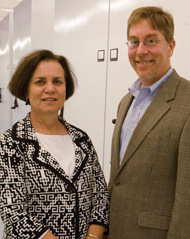 loading
loading
MilestonesTwo win MacArthur grants
 Julie BrownFaculty members Mary Tinetti and Richard Prum are among this year's winners of $500,000 fellowships from the MacArthur Foundation View full image
Mary Tinetti says that when the John D. and Catherine T. MacArthur Foundation called to tell her she had won one of its so-called genius grants, "the caller asked if I was sitting down." She was, and it's a good thing. Because it would have been much too ironic if the news had caused Tinetti to suffer just the kind of fall she has spent 25 years trying to prevent.
Tinetti, the Gladys Phillips Crofoot Professor of Medicine and Epidemiology and Public Health, was one of two Yale faculty members among the 24 winners of the $500,000 MacArthur Fellowships this year. The 58-year-old physician explains that when she first began studying falls, "common wisdom said that it was an inevitable aspect of aging and there wasn't much you could do to prevent it." But Tinetti and her colleagues have shaped a new understanding of why elderly people fall, and they have also been able to translate their basic research into a successful fall-reduction program. "The answer's very simple," she says. "You need to make the environment safer, cut down on medications that increase risk, improve balance through exercise, and maybe just encourage someone to use a cane. What is hard is getting people to do those things." Challenges to the common wisdom also mark the work of Richard Prum, Yale's other MacArthur winner. Prum, 48, the William Robertson Coe Professor of Ornithology, is perhaps best known for research on feathers that supports the theory that birds are descended from therapod dinosaurs. He has also shown how blue feathers get their color—not from pigment, but from light scattering (as in opals, mother-of-pearl, or bubbles). "As modern science becomes more and more specialized, the communities of scientists have grown more isolated from each other," says Prum. "I've made progress by bridging those gaps."
The comment period has expired.
|
|